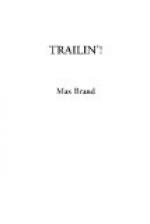“Nothin’ surprises me about a rich man’s death,” said the sergeant, “not in these here days of anarchy. Got a place to write? I want to make out my report.”
So Anthony led the grizzled fellow to the library and supplied him with what he wished. The sergeant, saying good-bye, shook hands with a lingering grip.
“I knew John Woodbury,” he said, “just by sight, but I’m here to tell the world that you’ve lost a father who was just about all man. So long; I’ll be seein’ you again.”
Left alone, Anthony Bard went to the secret room. The key fitted smoothly into the lock. What the door opened upon was a little grey apartment with an arched ceiling, a place devoid of a single article of furniture save a straight-backed chair in the centre. Otherwise Anthony saw three things-two pictures on the wall and a little box in the corner. He went about his work very calmly, for here, he knew, was the only light upon the past of John Bard, that past which had lain passive so long and overwhelmed him on this night.
First he took up the box, as being by far the most promising of the three to give him what he wished to know; the name of the slayer, the place where he could be found, and the cause of the slaying. It held only two things; a piece of dirty silk and a small oil can; but the oil can and the black smears on the silk made him look closer, closer until the meaning struck him in a flare, as the glow of a lighted match suddenly illumines, even if faintly, an entire room.
In that box the revolver had lain, and here every day through all the year, John Bard retired to clean and oil his gun, oil and reclean it, keeping it ready for the crisis. That was why he went to the secret room as soon as he heard the call from the garden, and carrying that gun with him he had walked out, prepared. The time had come for which he had waited a quarter of a century, knowing all that time that the day must arrive. It was easy to understand now many an act of the big grim man; but still there was no light upon the slayer.
As he sat pondering he began to feel as if eyes were fastened upon him, watching, waiting, mocking him, eyes from behind which stared until a chill ran up his back. He jerked his head up, at last, and flashed a glance over his shoulder.
Indeed there was mockery in the smile with which she stared down to him from her frame, down to him and past him as if she scorned in him all men forever. It was not that which made Anthony close his eyes. He was trying with all his might to conjure up his own image vividly. He looked again, comparing his picture with this portrait on the wall, and then he knew why the grey man at the Garden had said: “Son, who’s your mother?” For this was she into whose eyes he now stared.
She had the same deep, dark eyes, the same black hair, the same rather aquiline, thin face which her woman’s eyes and lovely mouth made beautiful, but otherwise the same. He was simply a copy of that head hewn with a rough chisel—a sculptor’s clay model rather than a smoothly finished re-production.




